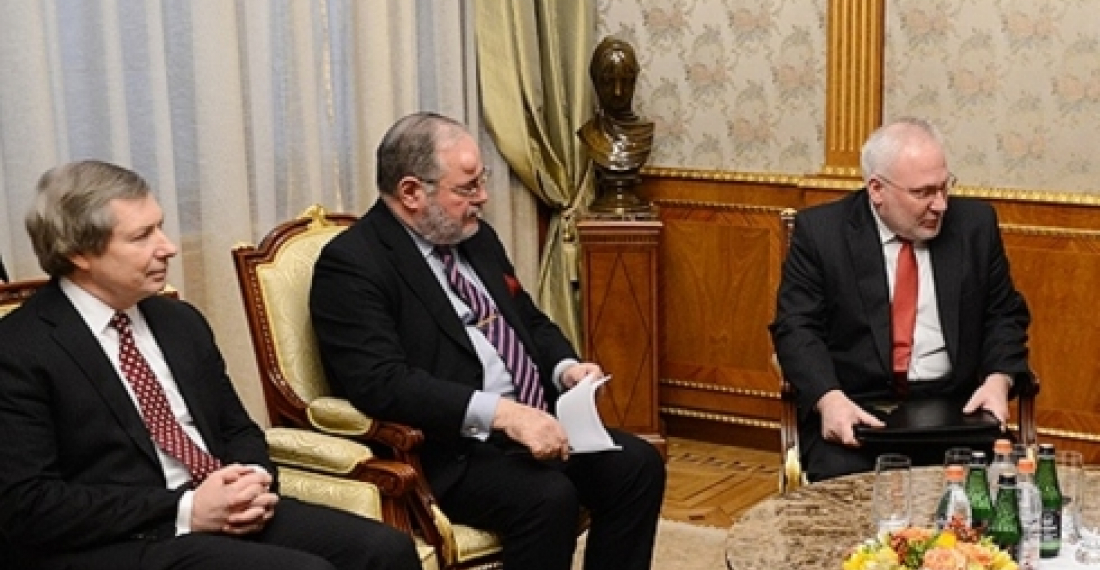The following is a commentary prepared by the editorial team of commonspace.eu
The recent statements by senior officials of the Government of Azerbaijan criticising the United States co-Chair of the OSCE Minsk Process, Ambassador James Warlick have created a controversy around the process.
There has in the past been other criticisms of the Minsk Process from the side of the Azerbaijani government, usually expressed through senior members of Parliament. This criticism usually targeted the three co-chair and the process as a whole, and on occasions was even justified. Last week's direct attacks against one of the co-Chair, led by Deputy Foreign Minister Araz Azimov are however of a more serious nature. Azimov is a tough and experienced diplomat who is not however prone to reckless talk. His statement must therefore be taken seriously.
Ambassador James Warlick has joined the Minsk Process only recently. He has since been on a steep learning curve. Like many others before him he is learning that though the Karabakh conflict may at first look like a straightforward dispute, with straightforward solutions, it is in fact a complex, multi layered conflict, deep rooted in history, and still an open wound. This is also one of those situations where a spade is often not called a spade, despite the fact that everybody knows that that is exactly what it is.
Warlick has in the short time that he has been co-Chair of the Minsk Process tried to reach out to media and civil society in the conflict affected areas and beyond. This is commendable. His choice of words in his famous tweets may not necessarily have always been the best, but his effort to make the Minsk Process more open and understandable to the outside world is to be praised. More information means more scrutiny, so reaction from either or both of the sides is to be expected.
Armenia directly, or through its diaspora community in the United States, has in the past had the occasion to criticise some of Mr Warlick's predecessors, although it remains a staunch supporter of the Minsk process in its current format. Mr Warlick's decision to meet Armenian and Azerbaijani diaspora communities in the United States was therefore always going to be controversial. Certainly somebody should reach out to these communities on the Karabakh issue - and to other parts of the diasporas of the two countries in other parts of the world. Whether Mr Warlick should be the one to do it is however another question.
In any case it is important that those involved if they do not like the message should not try to shoot the messenger, but rather address the substance.
This controversy is likely to remain a storm in a tea cup. However the bigger question of the efficacy of the Minsk Process in its present format as the best medium for a solution to the Nagorno-Karabakh conflict is more serious and pertinent. With a cease fire and a peace process that has been ongoing for more than twenty years everybody has the right to now ask this question. The answer often given is that since replacing, or even making minor changes, in the format of the Minsk Process is going to be extremely difficult if not impossible, sticking with what exists is the only option. So the international community finds itself supporting this process by default.
Yet the situation around the Nagorno-Karabakh conflict zone remains dangerous. The suffering of those who are directly affected, particularly refugees and IDPs, and people who live in and around the conflict areas is great. Casualties from the conflict, civilian as well as military occur on a daily basis. Everybody concerned therefore, be it the diplomats involved in the Minsk Process, or those that represent the Armenian and Azerbaijani positions in the negotiations, need to remain focused on the core issues of trying to unblock the impasse and find a solution. This should be the one and only urgent priority.
This commentary was prepared by the editorial team of commonspace.eu.
photo: Ambassador James Warlick left, with the other co-Chair of the Minsk Process.







